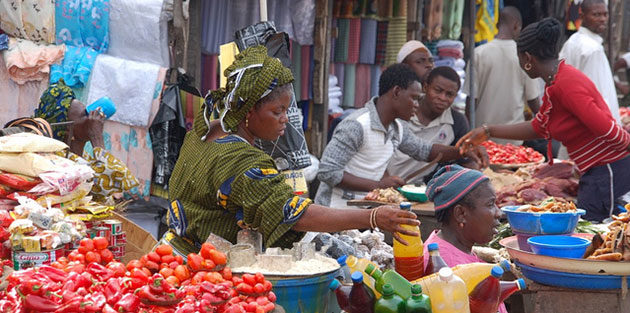Nigeria’s Moment: A visit to a West African nation reveals tragic failure, yet great potential by Doug Bandow
ABUJA, NIGERIA—Arriving in Abuja, Nigeria results in an almost simultaneous impression of poverty and potential. After decades of economic disappointment, even collapse, much of Africa is growing. Yet even its leading states—such as Nigeria—remain locked in an impoverished past and fail to live up to their extraordinary potential.
I’ve arrived with a journalist group organized by SLOK Holding Co., chaired by former governor Orji Uzor Kalu, a potential presidential contender. In Abuja the airport looked more appropriate for a small American town than for a capital city. While less chaotic than some other airports I have suffered through—Dhaka and Islamabad, for instance—it hardly befits what seems destined to be Africa’s leading nation. I changed money at an “exchange” with two men sitting at a small desk, cash in one drawer. The parking lot was cramped and disorganized.
Although cities such as Abuja, Lagos—Nigeria’s most populous urban area—and Port Harcourt—dominated by the nation’s oil industry—enjoy significant development, poverty is never far away. There are paved sidewalks, but usually in disrepair, and dirt roadsides remain common, even the norm, depending on city and district. Trash litters many streets. Most urban buildings are solidly constructed, some even stylish, but most are simple.
In Lagos wealth has created a genuine skyline on Victoria Island. Yet crowded streets filled with poor street vendors sit in the shadows of these fine structures. And the majority of residents live in vast expanses of simple homes crammed together. In Port Harcourt, shacks on overgrown lots dot the city, sometimes adjoining even the best buildings, such banks and hotels. Driving in we passed a pen filled with horses.
Electrical outages are constant, requiring any serious enterprise to maintain a generator. Riding an elevator is especially suspenseful; you find yourself plunged into darkness and brought to a jerky stop for what seems like an eternity, before the brightness returns and you continue on your way. Traffic gridlocks can be worse than Los Angeles, New York, or Washington—in Port Harcourt my group took a couple hours to go a few hundred yards at a particularly bad time.
Rural Nigeria is much poorer. Even the main highways lack even minimal maintenance, while burned and rusted wrecks, stripped of anything useful, litter the sides and medians. Trash is tossed alongside or piled in medians. Roads off the main drag are dirt, always rutted, often muddy, and barely adequate. Most shops are shacks built on dirt just feet from traffic. At times it appears that half of the population subsists by selling merchandise in traffic.
Still, hope remains. Everywhere in Nigeria I saw enterprise. People sit for hours under primitive lean-tos by the highway to sell drinks and food to travelers. Open-air markets, which seem to occur every couple miles, are bustling, with people dashing hither-and-yon selling most everything you can find in a department store or supermarket. At major intersections and along busy streets people sit in the median and walk into traffic hawking fruit, drinks, sim cards, picture frames, newspapers, magazines, cell phone chargers, cigarettes, sunglasses, watches, tools, socks, mops, cooking utensils, and even triangular hazard signs (quite appropriate given Nigeria’s traffic!).
Intellectual capital also is growing. Citizens of this former British colony typically speak English, the global commercial language. I visited a university filled with bright and engaging students hoping to make better lives for themselves and their country. What is desperately needed, said one business executive, a Nigerian who worked in America before returning to help manage his family’s business, is an “enabling environment” for enterprise.
In this the government fails miserably.
One problem is insecurity. Nigeria has suffered dictatorship, civil war, insurgency, militant violence, Islamic extremism, and crime. Kalu said “internal security is critical,” because without a police escort you cannot move throughout much of the country. One newspaper editor cited the risk of robbery in driving papers for distribution at night. Business executives, political figures, and expatriate workers routinely travel with armed escorts, especially in the Niger Delta in the south.
Corruption is rife. One expatriate worker observed: “Nigeria’s not a country. It is an opportunity.” Mundane economic mismanagement bears even greater blame. State enterprises, especially the National Nigerian Petroleum Corporation, are particular founts of abuse. The World Bank ranks Nigeria among the bottom third of nations in its Doing Business report.
Average Nigerians are commonly—indeed, uniformly—frustrated. The young especially crave the opportunities that the country’s dishevelment precludes. A third of adults under 25 are out of work. It’s one reason Nigeria sports a diaspora of millions. The driver of my cab to the airport to start this trip was a Nigerian. Even the more optimistic Nigerians with whom I spoke say much more has to be done, despite the progress they see. Public involvement is essential to create a freer and more honest business environment.
Some see hope in Kalu, a wealthy businessman who understands entrepreneurship and promotes political reform. As a teen he started trading palm oil. He now holds interests in energy, finance, journalism, real estate, and more. Among his recent enterprises is The New Telegraph newspaper. His success—without using government office to his own advantage—is unusual. Noted my Cato Institute colleague Marian Tupy: Nigerian politicians usually “become wealthy during their time in the governor’s mansion.” When talking about his nation’s future, Kalu denounced restrictive licensing and promoted markets; he advocated privatization, including in less traditional areas such as education, which he views as critical for Nigeria’s moral reformation. He told me that he “would like to see small government and big enterprise” and spoke with admiration of Ronald Reagan.
Kalu may run for president in 2015, though his chances are complicated by being an Igbo, a tribe whose members have not held the presidency in a half century. Substantial problems of ethnic division persist. Kalu viewed murderous attacks by the Islamic extremist group Boko Haram is a continuation of many earlier violent episodes.
The bigger question is whether he could actually implement his message of market liberalization if elected. Noted Tupy, Nigeria “has never had a president committed to small government, privatization and liberalization.” But Kalu forcefully argued that committed leadership could make the difference.
Obviously industrialized states have their problems, including sometimes galloping regulation (think ObamaCare!) and fail to fully live up to their potential. Yet they remain far freer, especially in economic affairs, enabling bright, enthusiastic, and hard-working people to prosper. Nigeria needs to follow the same broad growth path that enriched America and Western Europe, and more recently East Asia, including China.
The greatest tragedy of Nigeria’s poverty is that it is so unnecessary. Its people know what to do. The spirit of enterprise is everywhere. It’s time for the Nigerian people to liberate themselves. It’s time for freedom to come to Nigeria.
 ABOUT DOUG BANDOW
ABOUT DOUG BANDOW
Doug Bandow is a senior fellow at the Cato Institute and the author of a number of books on economics and politics. He writes regularly on military non-interventionism.


